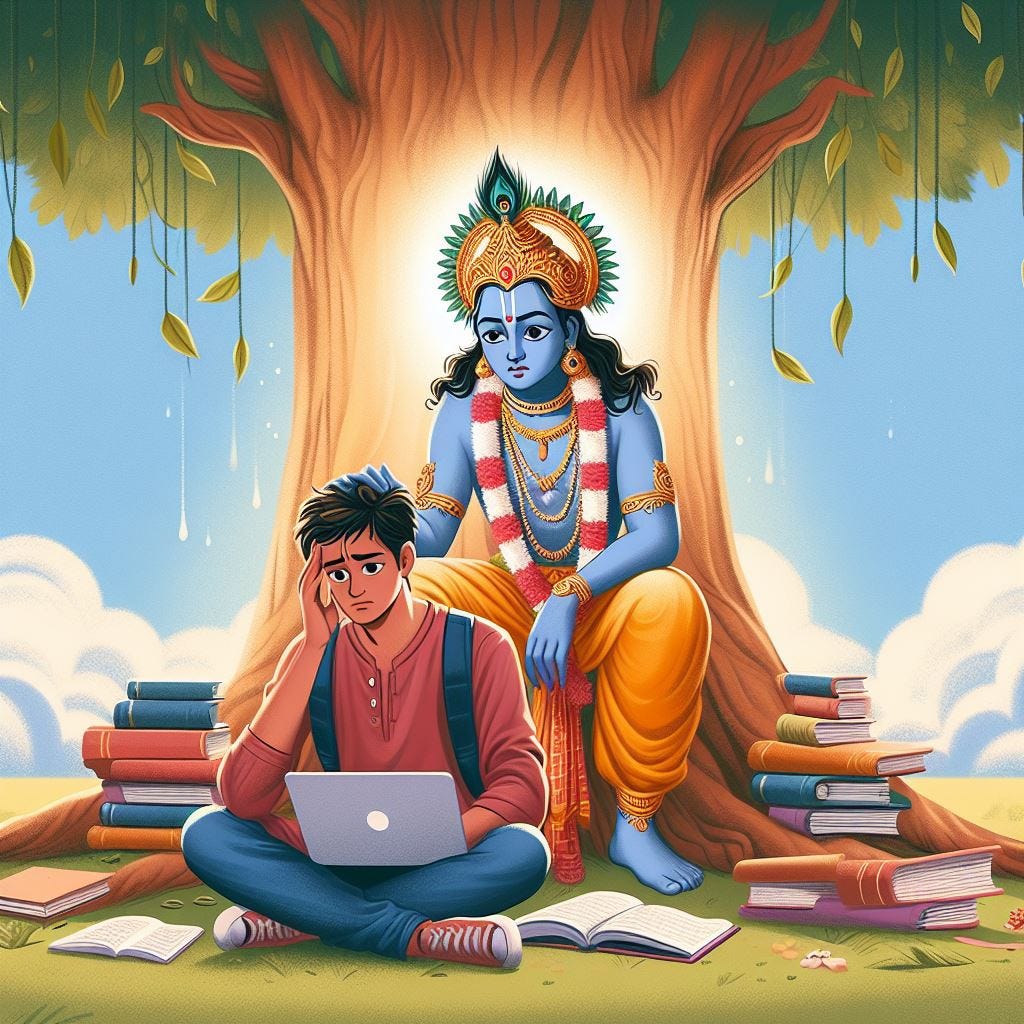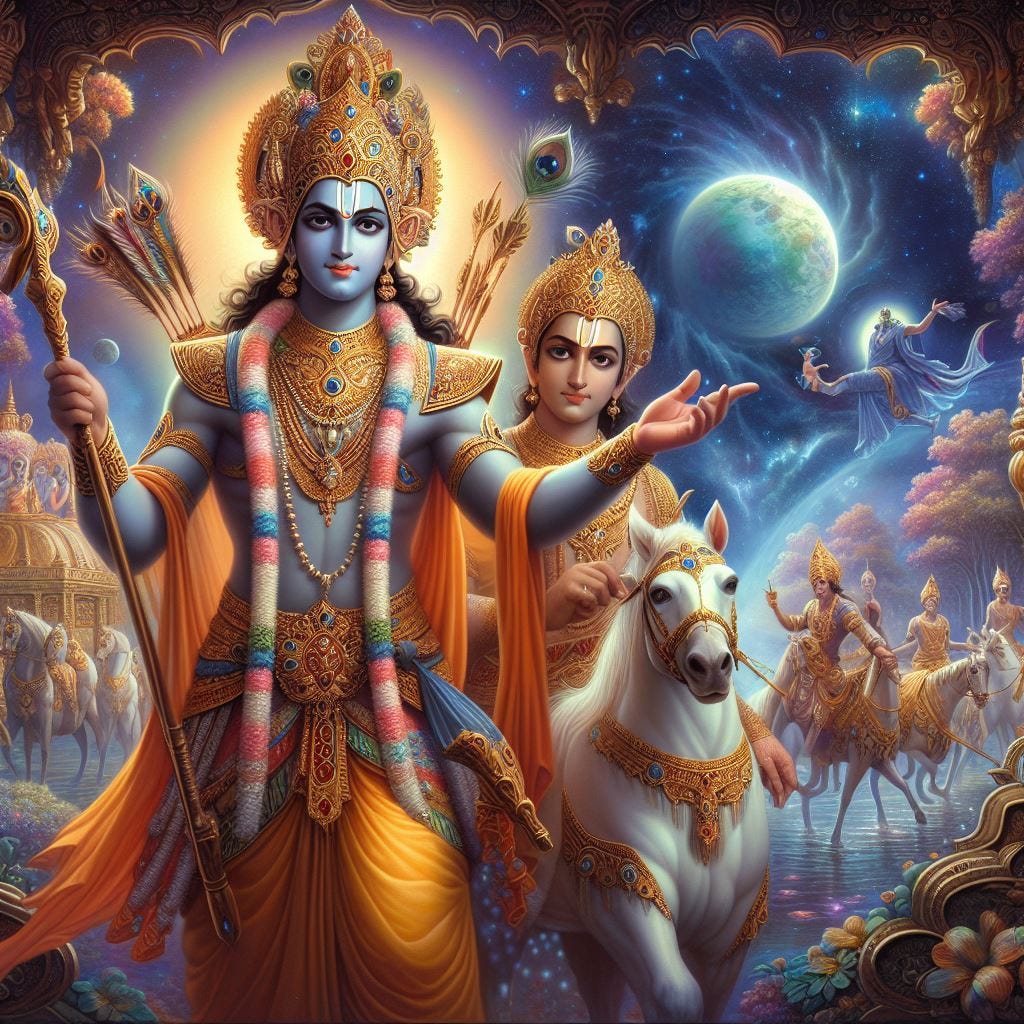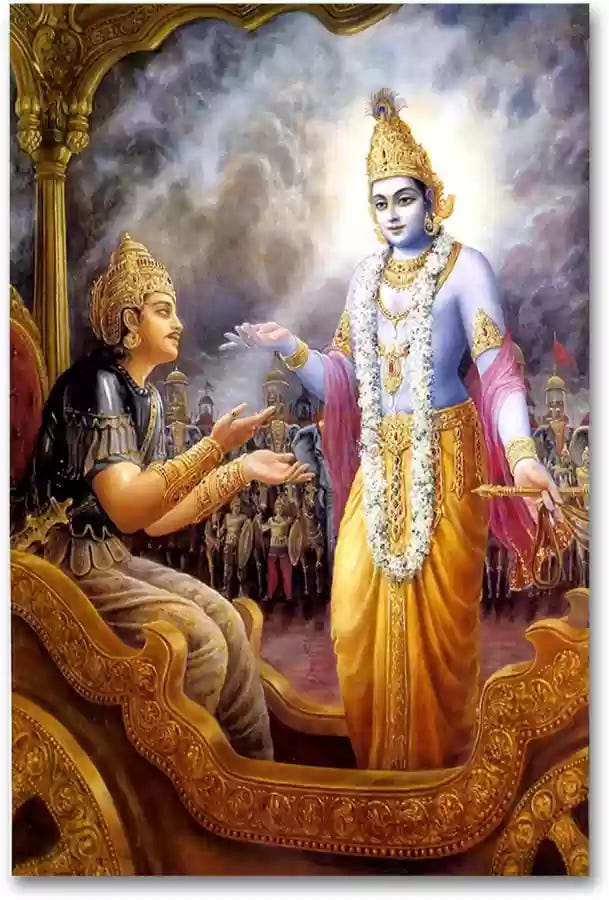Arjuna's Lament: What the Bhagavad Gita Can Teach Us about Efficacy
On Cycling Thoughts and Ethical Paralysis
Sorry if this week’s audio sounds slightly off. I was experimenting with a setting and forgot to back up the original. Won’t happen again. And also sorry if you’re getting this email twice. Something wonky happened on Substack’s end, I think!
“There Arjuna saw, standing their ground, fathers, grandfathers, teachers, maternal uncles, brothers, sons, grandsons, friends,
Fathers-in-law, and companions in both armies. And looking at all these kinsmen so arrayed, Arjuna, the son of Kunti,
Was overcome by deep compassion; and in despair he said: ‘Krishna, when I see these my own people eager to fight on the brink,
‘My limbs grow heavy, and my mouth is parched, my body trembles and my hair bristles,
‘My bow, Gandiva, falls from my hand, my skin’s on fire, I can no longer stand—my mind is reeling.
‘I see evil omens, Krishna: nothing good can come from slaughtering one’s own family in battle—I foresee it!
‘I have no desire for victory, Krishna, or kingship, or pleasures. What should we do with kingship, Govinda? What are pleasures to us? What is life?”
- The Bhagavad Gita. 1: 26-32 (Trans. W.J. Johnson)
There are a few philosophy texts that I used to teach that tended to make me emotional, either because I found them extremely profound, extremely beautiful, or a combination of both. Teaching these texts was sometimes a challenge, because they felt personal to me, especially at certain times in the semester, or if I was going through something myself. One text that would particularly hit me—almost every time—was The Bhagavad Gita from my Eastern Philosophy class.
For context, The Bhagavad Gita is a section of the much larger Hindu epic, The Mahabharata. It tells the story of Arjuna, a warrior prince, who is about to engage in an internecine civil war. He is a member of the warrior caste, so his literal purpose is to fight in battles, without regard for outcome or his own life, because—according to Hindu tradition—dying in battle would simply move him into the next life; and living (and dying) according to one’s caste (purpose) all but guarantees a fortuitous rebirth; an upgrade of sorts. He is accompanied by Krishna, an avatar of Vishnu: god of preservation.
In my Eastern Philosophy class, I would sandwich this text between the Buddhist Dhammapada (itself preceded in the syllabus by the Hindu Upanishads) and The Lotus Sutra. I went back and forth between traditions to show how each influenced the other: The Dhammapada being a Buddhist evolution from the cosmology presented in the Upanishads, with the Bhagavad Gita being, in part, a Hindu response to increasing Buddhist influence in the region. Indeed, we can see Arjuna’s response to the upcoming violence as quite Buddhist in his desire to avoid violence and the chaos it will cause: he is overcome with “deep compassion.” While the text itself is a Hindu renunciation of, and warning against, what it sees as a misguided Buddhist tendency to not act if it causes suffering, I always found Arjuna’s “lament” to be incredibly moving.
Arjuna’s mind is spinning in a way that always felt familiar: he cannot help but imagine the possible consequences of his actions, envisioning the almost-certain violence, bloodshed, and chaos that will ensue should the battle take place. There is an almost obsessive quality about his thinking, and his visions are intrusive and distracting. The chapter becomes a general chronicling of all the damage that would potentially happen if the battle were to take place, listed meticulously, tracing cascading paths of death, destruction, and chaos that would result. Arjuna also feels paralyzed by the sheer scope of all the scenarios he foresees. His meditation finally comes to a head in the final verses of the chapter:
“‘Oh ignominy! We are about to perpetrate a great evil— out of sheer greed for kingdoms and pleasures, we are prepared to kill our own people.
‘It would be better for me if Dhritarashtra’s armed men were to kill me in battle, unresisting and unarmed.’
Having spoken this on the field of conflict, letting slip his bow and arrow, his mind distracted with grief.”
The Bhagavad Gita. 1: 45-47
The image of Arjuna, flanked by Krishna, slumping down in his chariot, paralyzed and overcome by fear and projected grief, is a potentially tragic image; and one that many of us can relate to as our thoughts spin and paralyze us.
There were days in my class when I would feel a lump in my throat while reading the above passages aloud. I’d often act out Arjuna’s slump in the front of the classroom, leaning against the front wall and sliding down to the floor, letting my pen drop from my hand. It was a way for me to engage the students but also to release the emotions that I’d feel as I taught it.
Ostensibly, the lesson of the Bhagavad Gita is central to the caste system itself: stay in your lane, and lose yourself completely in the moment. Don’t think, act. Your place in the universe is fixed, and you must follow your karma all the way through this life and into the next, and the next, and the next. In fact, the lesson is so important, that Krishna basically puts a halt to time and space, and shows Arjuna the vast inner workings of the universe, and how his actions have a specific part to play. If he were to go against his karma, against his purpose, it would put everything else in jeopardy. Arjuna, naturally, sees the light and acquiesces, gloriously embracing his fate with the understanding that, according to Hindu tradition, death is a transitory state that gives way to new life. In death there is always new life; in new life there is always death. The process continues, infinitely. Even achieving moksha (a Hindu precursor to a Buddhist nirvana) only brings one to a momentary unity and oneness that lasts as a paradoxically eternal-yet-fleeting now that will once again be shattered by the awareness of an ego and distinction of self and other.
While, personally, my ethics and overall spiritual lean has always been Buddhist, there is a beautiful lesson to be learned in The Bhagavad Gita that can bring a soothing perspective when my intrusive, OCD thoughts root themselves into places that my Buddhist meditative practices sometimes cannot reach. Release one’s awareness, let go of the result, and act. Advance the narrative forward as it must be advanced. Don’t simply go through the motions, embrace them, be them. The text also spoke to students because of the implied hopelessness that Arjuna feels. The battle seems inevitable, and will obviously happen around him even if he chooses to not participate. There’s nothing he can do to stop it.
Krishna, as an avatar of Vishnu, urges Arjuna forward not to destroy his enemies for the sake of destruction (which would be the purview of Shiva), but instead to engage in battle for the sake of a much larger preservation, to fight without desire or attachments. The deaths of thousands, from a singular standpoint of one individual may seem senseless, but in the vast complexity of the cosmos, this action is crucial for the ongoing preservation of the universe, just as the consumption of food (and it’s destruction though the consumption) is crucial for the preservation of our bodies. Even those who are vegan and wish to spare animals suffering consume plants that were once alive. As Hindu philosophy sees it, life is a constant process and cycle of death, preservation, and birth: all present in and because of each other. Note, also, that this is not a justification of cruelty. Death/destruction is what it is; the cruelty is a human construct, and comes about through human awareness, and, sadly, at the hands of humans themselves. Suffering is inherent in our existence, but we have no right to increase it. In many ways, Buddhism steps in to elevate humans’ capacity to ease that suffering through understanding and intervention.

I have often encountered students who feel so incredibly “stuck” in a system of what they perceive as late-stage capitalism that continues to get worse and cause more suffering. It’s difficult to think of any action in which we engage that doesn’t do harm to someone or something else, or doesn’t perpetuate a system of oppression. The irony found in The Bhagavad Gita is that the answer is not in giving up or abandoning action so to speak. It is engagement—and, in a more contemporary and loose interpretation—an engagement with, through, and in one’s own particular efficacy. That is to say, what is your particular skill, talent, or superpower? How can we bring that forward in our day-to-day lives? And, again, in a more contemporary context, how can we bring those talents forward in a way that preserves life, and hopefully improves it?
As Krishna tells Arjuna:
“That action which is prescribed, unaccompanied by attachment, undertaking without desire or aversion by one who is not interested in result, is said to be purely constituted.
But that action strained after with some desire in mind, out of egoism, is said to be passionately1 constituted.
That action undertaken through delusion, reckless of consequence, death, or injury, ignoring one’s human capacity, is said to be darkly constituted.
The agent who is free from attachment and self-aggrandizement, resolute and persevering, the same in success and failure, is said to be purely constituted.”
The Bhagavad Gita, 18: 23-26.
Upon first glance, given the bloodshed that is to come within The Bhagavad Gita, Krishna’s warning against delusional actions which could bring death or injury seems hypocritical. But death within the context of battle, within the boundaries of Arjuna’s identity as a warrior, is by definition not delusional: it is his duty, or, more accurately, his purpose. While acting from a cosmically prescribed purpose may be antithetical to more existential Western traditions, we still can see the value of acting from a clear-minded, possibly selfless purpose.
Indeed, as The Bhagavad Gita continues, Krishna reveals his true form to Arjuna as well as temporarily giving him the ability to see the universe as it is, in all its complexity. Arjuna doesn’t just see the proverbial light, he becomes the light through which the entire universe is illuminated. His action is as important to the preservation of the universe as the most grand cosmic forces. His action is all action. All action is his action.

So then, when paralyzed by the utter feeling of smallness and inefficacy, while we may not have the luxury of being visited by the avatar of cosmic preservation itself, we can know that any action is better than none, and that what we do—on some level—always matters.
“Passionately” here should be read is “emotional” or impulsive, as in a “crime of passion.” The implication is one of a lack of self-control, or an act that is purely self-serving rather than acting according to one’s higher purpose.
Keep reading with a 7-day free trial
Subscribe to The Ecstatic Posthuman to keep reading this post and get 7 days of free access to the full post archives.






